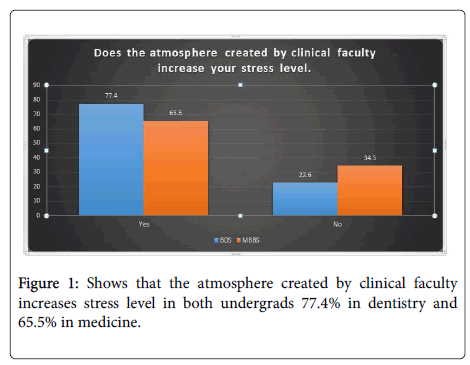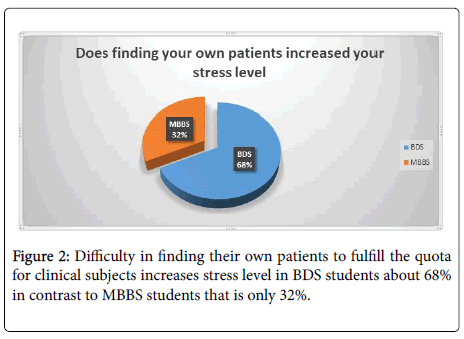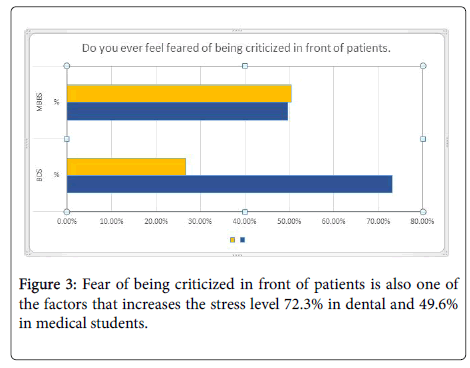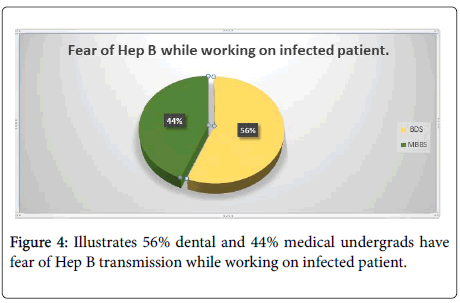Perceived Stress among Medical and Dental Undergraduates
Received: 27-Jan-2020 / Accepted Date: 10-Feb-2020 / Published Date: 17-Feb-2020 DOI: 10.4172/2332-0702.1000253
Abstract
Aim: This study aimed to determine various factors associated with perceived stress and to explore the impact of burnout on students’ academic year among medical and dental undergraduates at Qamar Dental and Darul Sehat Hospital, Karachi, Pakistan.
Introduction: Stress is a state of mental or emotional anxiety. Medical and Dental student’s life has been subject to different kinds of stress and sources could be academic pressure, fear of failing exams, assignments, modular system, and being criticized by supervisors in front of their own patients.
Methods and materials: This was a cross-sectional survey study design. It was conducted among 3rd and 4th year BDS students and 3rd, 4th, 5th year MBBS students who were officially registered in tertiary care hospital, Qamar Dental and Darul Sehat Hospital,Karachi, Sindh from 2017 December till date.
Results: This survey consists of 241 undergraduate students of LCMD including 52.3% dental and 47.7% medical students. Out of which 70.1% data received from females and 29.9% from male. Majority of the medical students i.e. 49.1% were studying in 4th year while 29% from 5th year. Fear of failing exams in BDS students was 74.8% and 66.4% in MBBS students. Large number of modules, assignments, in addition to the atmosphere created by clinical faculty showed 77.4% dental and 67% medical undergraduates felt overloaded, difficulty in finding their own patients to fulfill the quota for clinical subjects increases stress levels in BDS students about 68% in contrast to MBBS students that is only 32%. In our study it was found that the stress level among dental students is relatively high compared to medical students
Conclusion: In comparison with medical students, dental students showed comparatively higher level of stress symptoms. They were more apprehensive, distressed, and interpersonal sensitivity because of multifactorial reasons like self-efficacy beliefs, good performance pressure and assigned workload.
Keywords: Perceived Stress; Dental Students; Medical Students; Clinical Rotation; Quota; Criticism; Undergraduates
Aim
This study aimed to determine various factors associated with perceived stress and to explore the impact of burnout on student’s academic year among medical and dental undergraduates at Qamar Dental and Darul Sehat hospital, Karachi, Pakistan.
Introduction
Stress is a state of mental or emotional anxiety or tension resulting from adverse or challenging circumstances. Medical and Dental student’s life has been subject to different kinds of stress and sources could be academic pressure, fear of failing in exams, assignments, modular system, being criticized by supervisors right in front of their own patient, especially have fear of Hep B transmission while working on infected patient.
A systemic review stated that dentistry has been ranked as an extraordinary stressful profession as a student as well as a clinician after graduation [1-4]. Some studies have linked stress with academic year, gender and living territory [1,5].
Naidu et al. reported that stress among 1st and 2nd year dental students was mainly due to academic performance whereas in clinical years, clinical skills and interpersonal relationships are the main reasons [1,6].
In May 2009, Argy Polychronopoulou alleged dental education as one of the most back breaking, challenging, taxing and highly stressful domain, as presumptions with the dental students to have diverse proficiencies in academic as well as in clinical skills [7-9].
Stress during medical training is increasingly being reported in published literature. Studies have shown fairly high level of emotional distress such as depression, impairment of functioning in classroom performance among medical students [10-12].
Medical education has always been observed as a popular choice for tertiary education. Only those who have excellent academic achievements can be successful in the course. Therefore, the medical programs are more competitive and stressful for those students who are accepted [10,13,14].
Hence, the major objective of our study is to determine perceived stress among medical and dental undergraduates. This will help plan out measures to lessen stress and burnout among undergraduates.
Materials and Methods
This was a cross-sectional survey study design. It was conducted among 3rd and 4th year BDS students and 3rd, 4th, 5th year MBBS students who were officially registered in tertiary care hospital Qamar Dental and Darul Sehat hospital, Karachi, Sindh from 2017 December till date. Both male and female students were invited to voluntarily participate in this study. The total number of dental students was 124 while medical students were 113. All the participants were provided self-administered close ended questionnaire and gathered data was analyzed using SPSS version 22.0, Count with percentages reported for qualitative data sets, whereas Pearson Chi Square test of Independence was used to explore the association of perceived stress with type of faculty. p values less than 0.05 were considered significant.
Results
This survey consists of 241 undergraduate students of LCMD including 52.3% dental and 47.7% medical students. Out of which 70.1% data received from females and 29.9% from male.
Table 1 shows 95.3% having age group between 20-25 years, from which 86.7% were single. Majority of the medical students i.e. 49.1%were studying in 4th year while 29% from 5th year. Study sample shows that 73% of medical and dental students were from clinical rotations. Table 2 reports the association of perceived stress with program, 74.8% of BDS students and 66.4% MBBS students showed that they had a fear of failing exams whereas 66.1% dental and 62.8% medical undergrads feared being unable to catch up with fellow colleagues, if left behind. Large number of modules, assignments, in addition to the atmosphere created by clinical faculty showed 77.4% dental and 67% medical undergraduates felt overloaded (Figure 1). Due to which most of the dental (82.8%) and medical students (72.6%) experienced lack of time for relaxation. Competition for grades increases the stress level of both medical and dental undergrads (59.3-69.9%) and also affects the pattern of sleep in dental (77.2%) and medical (78.8%) apprentices. Increased level of stress leads to teeth grinding in 39% dental and 28.6 % medical students, as well as G.I.T discomfort in both dental and medical undergraduates with 65% and 64.6% (Table 2). The p value was found statistically significant for the created atmosphere by clinical faculty, difficulty in finding of own patients and being criticized in front of patients.
| Characteristics | n | % | |
|---|---|---|---|
| Gender | Male | 72 | 29.9 |
| Female | 169 | 70.1 | |
| Age group | 20-25 | 225 | 95.3 |
| 26-30 | 11 | 4.7 | |
| Academic | 3rd year | 37 | 21.9 |
| 4th year | 83 | 49.1 | |
| 5th year | 49 | 29 | |
| Program | BDS | 124 | 52.3 |
| MBBS | 113 | 47.7 | |
| Marital status | Married | 32 | 13.3 |
| Single | 209 | 86.7 | |
| Rotation | Pre-clinical rotation | 65 | 27 |
| Clinical rotation | 176 | 73 | |
Table 1: Baseline characteristics of studied samples (n=241).
| Perceived stress questions | BDS | MBBS | p values | |||
|---|---|---|---|---|---|---|
| n | % | n | % | |||
| Fear of failing exams affects your performances? | Yes | 92 | 74.8 | 75 | 66.4 | 0.155 |
| Do you feel overloaded due to large number of modules/assessments/assignments? | Yes | 96 | 77.4 | 75 | 67 | 0.073 |
| Fear of being unable to catch up with fellow colleague, if left behind? | Yes | 82 | 66.1 | 71 | 62.8 | 0.596 |
| Do you experience lack of time for relaxation? | Yes | 101 | 82.8 | 82 | 72.6 | 0.059 |
| Lack of co-operation by patients increased your level of stress? | Yes | 82 | 67.2 | 67 | 59.8 | 0.24 |
| Did you find yourself grinding your teeth? | Yes | 48 | 39 | 32 | 28.6 | 0.091 |
| Do you experience increased level of stress lead to greater dependency on caffeine, nicotine, and theophylline? | Yes | 47 | 38.2 | 49 | 43.4 | 0.421 |
| Do you feel insecure regarding your professional future? | Yes | 62 | 50.8 | 53 | 46.9 | 0.548 |
| Do you ever feel difficulty in learning new clinical procedures? | Yes | 58 | 47.2 | 48 | 42.5 | 0.471 |
| Competitions for grades increase your stress level? | Yes | 86 | 69.9 | 67 | 59.3 | 0.088 |
| Does increase level of stress affects your pattern of sleep? | Yes | 95 | 77.2 | 89 | 78.8 | 0.778 |
| Do you feel G.I.T discomfort as a result of increased level of stress? | Yes | 80 | 65 | 73 | 64.6 | 0.944 |
*p<0.05 was considered significant using Pearson Chi Square test of Independence
Table 2: Association of perceived stress with program.
The Interpretation of Associated Perceived Stress among 3rd, 4th and 5th Medical Academic Year are as Follows
Among 3rd academic year
86.5% of the students agreed that the atmosphere generated by faculty raised their stress subsequently and also found less time for relaxation as compared to final year students. Whereas 73% found due to lack of co-operation from patients and feared of being criticized in front of patients increase burnout and stress level (Table 3).
| Perceived stress questions | Academic | p value | ||||||
|---|---|---|---|---|---|---|---|---|
| 3rd year | 4th year | 5th year | ||||||
| n | % | n | % | n | % | |||
| Fear of failing exams affects your performances? | Yes | 25 | 67.6 | 60 | 73.2 | 38 | 77.6 | 0.585 |
| Do you feel overloaded due to large number of modules/assessments/assignments? | Yes | 29 | 78.4 | 65 | 79.3 | 33 | 67.3 | 0.278 |
| Fear of being unable to catch up with fellow colleague, if left behind? | Yes | 20 | 54.1 | 58 | 69.9 | 34 | 69.4 | 0.205 |
| Does the atmosphere created by clinical faculty increase your stress level? | Yes | 32 | 86.5 | 57 | 68.7 | 34 | 69.4 | 0.105 |
| Do you experience lack of time for relaxation? | Yes | 32 | 86.5 | 64 | 77.1 | 34 | 69.4 | 0.176 |
| Lack of co-operation by patients increased your level of stress? | Yes | 27 | 73 | 53 | 63.9 | 29 | 59.2 | 0.411 |
| Does finding your own patients increased your stress level? | Yes | 31 | 83.8 | 50 | 60.2 | 18 | 36.7 | <0.01* |
| Do you ever feel stressed because of fear of HepB, while working on infected patient? | Yes | 29 | 78.4 | 52 | 63.4 | 26 | 53.1 | 0.054 |
| Did you find yourself grinding your teeth? | Yes | 14 | 37.8 | 27 | 32.5 | 17 | 34.7 | 0.85 |
| Do you experience increased level of stress lead to greater dependency on caffeine, nicotine, and theophylline? | Yes | 14 | 37.8 | 39 | 47 | 19 | 38.8 | 0.525 |
| Do you feel insecure regarding your professional future? | Yes | 12 | 32.4 | 46 | 55.4 | 24 | 49 | 0.067 |
| Do you ever feel feared of being criticized in front of patients? | Yes | 27 | 73 | 51 | 61.4 | 24 | 49 | 0.076 |
| Do you ever feel difficulty in learning new clinical procedures? | Yes | 14 | 37.8 | 40 | 48.2 | 25 | 51 | 0.447 |
| Competition for grades increase your stress level? | Yes | 25 | 67.6 | 59 | 71.1 | 26 | 53.1 | 0.104 |
| Does increase level of stress affects your pattern of sleep? | Yes | 26 | 70.3 | 68 | 81.9 | 36 | 73.5 | 0.298 |
| Do you feel G.I.T discomfort as a result of increased level of stress? | Yes | 23 | 62.2 | 55 | 66.3 | 32 | 65.3 | 0.909 |
*p<0.05 was considered significant using Pearson Chi Square test of Independence
Table 3: Reports the association of perceived stress among 3rd, 4th and 5th medical academic year.
78.4% reported higher levels of stress because of fear of hepatitis B from patients and overloaded due to the large number of modules. Due to which 37.8% find teeth grinding habit and mostly dependent on caffeine and felt difficulty in learning new clinical procedures. Therefore 83.8% reported stressed as they have to search for their own patients.
Among 4th academic year
This year is most likely to cite extreme workload, dependency on caffeine and professional issues as stressors. 79.3% felt overloaded due to large number of modules and 69.9% feared being unable to catch up with fellow colleagues. Due to which 55.4% felt insecure regarding their professional future while 71.1% reported that competition for grade increase their anxiety and stress level. This factor somehow ultimately leads to greater dependency on caffeine/nicotine therefore 47.0% reported stress due to caffeine dependency and 66.3% reported for feeling G.I.T discomfort. However 81.9% reported disturb sleep patterns due to stress.
Among 4th academic year
During 5th academic year, fear of failing in exams is the major cause of perceived stress, 77.6% reported fear related to exams and 51.0% felt difficulty in learning new clinical procedure.
Discussion
Stress is a physical/psychological phenomenon developed via self cognition of provoking factors after interacting with someone ’ s surroundings, it has been experienced by people of different domains like in social, academic and work settings, and different studies show excess stress can be debilitating [1].
In our study, we evaluated perceived stress among dental and medical students including its sources such as academic performance, psychosocial and familial factors [10]. This study was conducted among 124 dental and 113 medical students. In our study it was found that 74.8% dental and 66.4% medical students has the fear of failure in exams as one of the most perceived stress similarly another studies conducted in Malaysia, South Africa and Indian outlook also reported fear of failure as most stressful element among undergraduates [1, 15,16]. Stress of being unable to catch up with fellow colleague, if getting behind in studies was also one of the fear reported 66.1% in dental students and 62.8% in medical students, studies of Malaysia, Greek and other multi-country also described fear of stress if left behind as one of the main basis [1,7,9,17]. This may be due to the demanding schedule with their objective to be competent both academically as well as clinically [1]. Competition for grades increases the stress level of both medical and dental undergrads (59.3%-69.9%) and also affects the pattern of sleep in dental (77.2%) and medical (78.8) apprentices. And this may be the reason that 83% dental and 73% medical students experience lack of time for relaxation as a stress factor. Study conducted in South Africa shows 64% responded that sleeping help them to cope with stress [15].
Students of both MBBS and BDS programs feel overloaded due to large number of assignments/modules and assessments. Among academic stressors, test/ exams were the main basis of stress. Those who perceive test/exam as a burden may experience stressful situations, while for others, who consider exams valuable, assist them in learning [10].
In our study greatest stress level was found among third and fourth year students owing to transition from preclinical to clinical training phase. This explanation is consistent with the studies done in Malaysia and Saudi Arabia perhaps in ability for time management adequately and students may become incompetent to focus on their studies [1,18] and maybe due to the atmosphere created by clinical faculty increases stress level in both undergraduates to fulfil clinical quotas for which they may need to manage their own patients which shows peak stress 68% in BDS students (Figure 2). Another explanation is that senior undergraduates reported more stress in education and clinical skills by increased interaction with faculty members and patients as well as high hopes from faculty members as they enter clinical phase [1]. Increased level of stress leads to teeth grinding in 39% dental and 28.6% medical students, as well as GIT discomfort in both dental and medical (Figure 3) undergraduates.
Most of BDS students 56% and also MBBS students 44% feel stressed in treating hepatitis B patients while working on infected patients, possibly due to transmission from sharp dental instruments or lack of knowledge or information regarding infection control (Figure 4) [18].
Concerning their professional future after graduation was perceived as stressful as they progress to the final year, studies of India, Saudi Arabia and Nigeria also shows the similar stress factor. This may be due to job insecurity, less job opportunities, unfavorable dentistpopulation ratio and limited postgraduate courses especially for dental graduates. Study done in Malaysia shows reverse trend for professional future due to job security by paid compulsory government service [1,7,17].
In our study it was found that the stress level among dental students is relatively high 66% compared to medical students that is 56% as to fulfil clinical quotas, managing their own patients and overloaded due to large number of assignments.
As an outcome, many authors have proposed the dental as well as medical curriculum should include lectures on stress management, time management, communication skills and behaviour management [15,19,20]. These lectures must be conducted earlier in session to assist students to cope with the stress issues [15].
Conclusion
In comparison with medical students, dental students show comparatively higher levels of stress. During the study were more apprehensive, distressed and interpersonal sensitivity because of multifactorial reasons like self-efficacy beliefs, good performance pressure, assigned workload,
While, dental students often deals with stress particularly related to clinical sessions, patient management which encompass late patient’s appointment, clinical quotas, tackling uncooperative patients, highly skilled technical work and financial factor. All these factors somehow contributes to pathetic academic results, absenteeism, stress induced disorder, disoriented performance.
In comparison with university education, medical and dental schools have unique stresses, medical training declared to have higher level of psychological toxicity and ultimately have negative impact on physical and mental health of student, this toxic stress affects their patient care. On contrary excessive educational workload burden with higher level of educational demand limited time for friends and family. Lack of spare time plays vital role in creating burnout levels among medical and dental student.
References
- Babar MG, Hasan SS, Ooi YJ, Ahmed SI, Wong PS, et al. (2015) Perceived sources of stress among Malaysian dental students. Int J Med Educ 6: 56-61.
- Peker I, Alkurt MT, Usta MG, Turkbay T (2009) The evaluation of perceived sources of stress and stress levels among Turkish dental students. Int Dent J 59: 103-111.
- Rajab LD (2001) Perceived sources of stress among dental students at the University of Jordan. J Dent Educ 65: 232-241.
- Ahmad MS, Md Yusoff MM, Razak IA (2011) Stress and its relief among undergraduate dental students in Malaysia. Southeast Asian J Trop Med Public Health 42: 996-1004.
- Alzahem AM, Van der Molen HT, Alaujan AH, Schmidt HG, Zamakhshary MH, et al. (2011) Stress amongst dental students: A systematic review. Eur J Dent Educ 15: 8-18.
- Naidu RS, Adams JS, Simeon D, Persad S (2002) Sources of stress and psychological disturbance among dental students in the West Indies. J Dent Educ 66: 1021-1030
- Polychronopoulou A, Divaris K (2009) Dental students’ perceived sources of stress: A multi-country study. J Dent Educ 73: 631-639.
- Plasschaert AJ, Holbrook WP, Delap E, Martinez C, Walmsley AD, et al. (2005) Profile and competences for the European dentist. Eur J Dent Educ 9: 98-107.
- Divaris K, Barlow PJ, Chendea SA, Cheong WS, Dounis A et al. (2008) The academic environment: The students’ perspective. Eur J Dent Educ 12: 120-130.
- Rahman AA, Al Hashim BN, Al Hiji NK, Al-Abbad Z (2013) Stress among medical Saudi students at college of medicine, King Faisal University. J Prev Med Hyg 54: 195-199.
- Polychronopoulou A, Divaris K (2005) Perceived sources of stress among Greek dental students. J Dent Educ 69: 687-692.
- Frick LJ, Frick JL, Coffman RE, Dey SJAJoPE (2011) Student stress in a three-year doctor of pharmacy program using a mastery learning educational model. Am J Pharm Educ 75: 64.
- Yusoff MS, Rahim AF, Yaacob MJ (2010) Prevalence and sources of stress among Universiti Sains Malaysia medical students. The Malays J Med Sci 17: 30-37.
- MOHD SIDIK S, Rampal L, Kaneson N (2003) Prevalence of emotional disorders among medical students in a Malaysian university. Asia Pacific Family Medicine 2: 213-217.
- Bhayat A, Madiba TK (2017) The self-perceived sources of stress among dental students at a South African Dental School and their methods of coping. South African Dent J 72: 6-10.
- Tangade PS, Mathur A, Gupta R, Chaudhary S (2011) Assessment of stress level among dental school students: An Indian outlook. Dent Res J 8: 95-101.
- Polychronopoulou A, Divaris K (2010) A longitudinal study of Greek dental students’ perceived sources of stress. J Dent Educ 74: 524-530.
- El-Masry R, Ghreiz SM, Helal RM, Audeh AM, Shams T et al. (2013) Perceived stress and burnout among medical students during the clinical period of their education. Ibnosina J Med Biomed Sci. 5: 179-187.
- Vanishree N, Jeswin J, Madhusudhan S (2011) Suicide amongst dentists: Are you at risk. J Oral Health Comm Dent 5: 160-163.
- Orner G, Mumma RD (1976) Mortality Study of Dentists: Final Report Prepared for... National Institute for Occupational Safety and Health. Temple University of the Commonwealth System of Higher Education, Health Sciences Center, School of Dentistry.
Citation: Maryam OM, Asma S, Ali Shah BB, Qureshi RN, Ali SA (2020) Perceived Stress among Medical and Dental Undergraduates. J Oral Hyg Health 8: 253. DOI: 10.4172/2332-0702.1000253
Copyright: © 2020 Shamim MO, et al. This is an open-access article distributed under the terms of the Creative Commons Attribution License, which permits unrestricted use, distribution, and reproduction in any medium, provided the original author and source are credited.
Share This Article
Open Access Journals
Article Tools
Article Usage
- Total views: 2119
- [From(publication date): 0-2020 - Apr 19, 2024]
- Breakdown by view type
- HTML page views: 1550
- PDF downloads: 569




